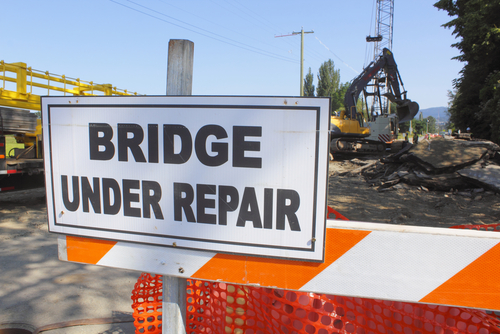
Under new legislation sponsored by a bipartisan group of Michigan lawmakers, the state could allow municipalities to enter public-private partnerships as an added means to update aging infrastructure.
The bills, SBs 1215-1218, were introduced by state Sens. Ken Horn (R-Frankenmuth), Jeremy Moss (D-Southfield) and Wayne Schmidt (R-Traverse City) and were approved by the Michigan Senate Economic and Small Business Development Committee earlier this month and will next be considered by the full Senate.
If enacted, the legislation would allow municipalities to engage with private investment to help manage local bridges, with a particular eye on Bay City, Michigan, where two aging bridges have proven to require repair costs far in excess of what the local government can pay.
“Michigan’s infrastructure has been suffering for years, and I’m happy to partner with Bay City to offer this creative solution to address an issue that affects the entire Great Lakes Bay Region,” Horn said. “The bills seek to resolve a longstanding problem by allowing local governments across the state to address their unique infrastructure needs.”
At stake with bridges, like those being dealt with in Bay City, is that even temporary closures can cause massive backlogs in terms of traffic volume and prove a detriment to public safety and the regional economy, according to bill supporters.
Horn cited Bay City as a place where lawmakers have struggled for years for solutions to repair two of four major bridges crossing the Saginaw River, which splits the city in two. The other two bridges are state-owned, and therefore unaffected by this legislation. Yet those four traffic routes are the area’s lifeblood. At the foot of Liberty Bridge alone reside two business districts.
Infrastructure repair has proven a major political and economic issue in Michigan for years, with few ideas managing to gain traction long term. Even the current governor Gretchen Whitmer campaigned on a message of “Fix the Damn Roads.” As such, it’s notable that these bills have received support from numerous local Chambers of Commerce, including the Bay Area and Saginaw County Chambers, together with regional businesses. Both chambers have pledged to support sustainable, long-term solutions to infrastructure issues, fearing the threat they pose to economic growth.
“This proposed public-private partnership for Bay City’s bascule bridges creates an opportunity for the municipality to divest itself of a long-term liability, while providing a private investment opportunity that includes funding mechanisms for future repairs,” Ryan Tarrant, president and CEO of the Bay Area Chamber of Commerce, told Transportation Today. “Bay City, in particular, has used an outsized portion of its state road funding over the past several years for basic repair and maintenance. However, these costs have not included major repairs that are now needed. Given the estimated cost of repairs of a minimum $30-plus million, it is evident that a public-private partnership is the only option for the community.”
The bill’s authors point out that the ongoing pandemic has made gathering funding even more challenging.
“We are enduring a disruptive pandemic that is both accelerating financial hardships on local communities and delaying needed investments to our crumbling infrastructure,” Moss said. “As all Michiganders know, our broken roads and bridges still need to be fixed. These bills offer a new and creative tool for local municipalities to fix bridges while maintaining strong community oversight of each project — which will keep our cities thriving and accessible.”
For many years, Michigan’s infrastructure repair needs have far outpaced the government’s ability to fund them. The problem is worse at the local level, however, where there are fewer resources or options to repair infrastructure when state or federal funding is unavailable. In the best-case scenario, the lack of funding can lead to widening potholes and crumbling roads that cause damage to vehicles, while the worst-case scenarios can lead to cities closing or restricting vital roads.
In return, this can leave motorists with few options and harm local economies.
“Our budget is hurting, and revenues are down, but that doesn’t stop wear and tear on our roads and bridges,” said Schmidt. “We need to find a way to address these immediate needs, and this is a good start to picking back up on the infrastructure repairs we began prior to COVID-19.”